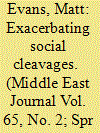| Srl | Item |
| 1 |
ID:
104341


|
|
|
|
|
| Publication |
2011.
|
| Summary/Abstract |
This article challenges the traditional model of the media as a positive agent for political socialization. The increasing variety of news sources has reversed the role of the media, contributing to growing cultural fragmentation, rather than the unification of nations. One of the most volatile cultural cleavages in countries around the world is the clash between fundamentalist and secular members of the same religion. This work explores the role of the media in societal rifts through a study of the secular and religious press in Israel. The potentially divisive impact of the media has implications for other countries in the Middle East that are also characterized by religious-secular tensions.
|
|
|
|
|
|
|
|
|
|
|
|
|
|
|
|
| 2 |
ID:
109069


|
|
|
|
|
| Publication |
2011.
|
| Summary/Abstract |
This article examines the manner in which rituals and symbols associated with sacred time have influenced conflict initiation. Leaders will time their attacks with sacred dates in the religious calendar if the force multiplying effects of sacred time, motivation, and vulnerability, outweigh its force dividing effects, constraint, and outrage. This is most likely to occur under three conditions: When conflict occurs across religious divides, when the sacred day is unambiguous in significance and meaning, and when rituals connected to that day will undermine an opponents' military effectiveness. I illustrate these effects with twentieth century examples, including the timing of insurgent attacks in Iraq and the launching of the 1973 Arab-Israeli War. By exploring the pervasive effects of religious calendars on modern combat, I hope to redirect the focus of the study of religion and violence away from the narrow preoccupation with fundamentalism and terrorism and onto the much broader range of cases in which religion shapes secular conflict in multiple-and often unexpected-ways.
|
|
|
|
|
|
|
|
|
|
|
|
|
|
|
|